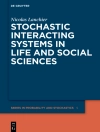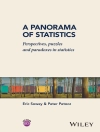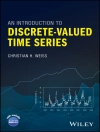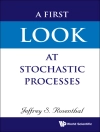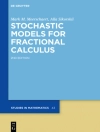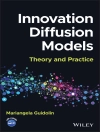Covers the latest developments in direction dependence research
Direction Dependence in Statistical Modeling: Methods of Analysis incorporates the latest research for the statistical analysis of hypotheses that are compatible with the causal direction of dependence of variable relations. Having particular application in the fields of neuroscience, clinical psychology, developmental psychology, educational psychology, and epidemiology, direction dependence methods have attracted growing attention due to their potential to help decide which of two competing statistical models is more likely to reflect the correct causal flow.
The book covers several topics in-depth, including:
* A demonstration of the importance of methods for the analysis of direction dependence hypotheses
* A presentation of the development of methods for direction dependence analysis together with recent novel, unpublished software implementations
* A review of methods of direction dependence following the copula-based tradition of Sungur and Kim
* A presentation of extensions of direction dependence methods to the domain of categorical data
* An overview of algorithms for causal structure learning
The book’s fourteen chapters include a discussion of the use of custom dialogs and macros in SPSS to make direction dependence analysis accessible to empirical researchers.
Table des matières
ABOUT THE EDITORS
NOTES ON CONTRIBUTORS
ACKNOWLEDGMENTS
PREFACE
PART I: FUNDAMENTAL CONCEPTS OF DIRECTION DEPENDENCE
1. From Correlation to Direction Dependence Analysis: 1888-2018
Yadolah Dodge and Valentin Rousson
2. Direction Dependence Analysis: Statistical Foundations and Applications
Wolfgang Wiedermann, Xintong Li, and Alexander von Eye
3. The Use of Copulas for Directional Dependence Modeling
Engin Sungur
PART II: DIRECTION DEPENDENCE IN CONTINUOUS VARIABLES
4. Asymmetry Properties of the Partial Correlation Coefficient: Foundations for Covariate-Adjustment in Distribution-based Direction Dependence Analysis
Wolfgang Wiedermann
5. Recent Advances in Semi-Parametric Methods for Causal Discovery
Shohei Shimizu and Patrick Blöbaum
6. Assumption Checking for Directional Causality Analyses
Phillip K. Wood
7. Complete Dependence: A survey
Santi Tasena
PART III: DIRECTION DEPENDENCE IN CATEGORICAL VARIABLES
8. Locating Direction Dependence using Log-Linear Modeling, Configural Frequency Analysis, and Prediction Analysis
Alexander von Eye and Wolfgang Wiedermann
9. Recent Development on Asymmetric Association Measures for Contingency Tables
Xiaonan Zhu, Zheng Wei and Tonghui Wang
10. Analysis of asymmetric dependence for three-way contingency tables using the subcopula approach
Daeyoung Kim and Zheng Wei
PART IV: APPLICATIONS AND SOFTWARE
11. Distribution-based Causal Inference: A Review and Practical Guidance for Epidemiologists
Tom Rosenström and Regina García-Velázquez
12. Determining causality in relation to early risk factors for ADHD: The case of breastfeeding duration
Joel T. Nigg, Diane D. Stadler, Alexander von Eye and Wolfgang Wiedermann
13. Direction of Effect between Intimate Partner Violence and Mood Lability: A Granger Causality Model
G. Anne Bogat, Alytia A. Levendosky, Jade Kobayashi and Alexander von Eye
14. On the Causal Relation of Academic Achievement and Intrinsic Motivation: An Application of Direction Dependence Analysis using SPSS Custom Dialogs
Xintong Li and Wolfgang Wiedermann
Index
A propos de l’auteur
WOLFGANG WIEDERMANN is Associate Professor at the University of Missouri-Columbia. He received his Ph.D. in Quantitative Psychology from the University of Klagenfurt, Austria. His primary research interests include the development of methods for causal inference, methods to determine the causal direction of dependence in observational data, and methods for person-oriented research settings. He has edited books on advances in statistical methods for causal inference (with von Eye, Wiley) and new developments in statistical methods for dependent data analysis in the social and behavioral sciences (with Stemmler and von Eye).
DAEYOUNG KIM is Associate Professor of Mathematics and Statistics at the University of Massachusetts, Amherst. He received his Ph.D. from the Pennsylvania State University in Statistics. His original research interests were in likelihood inference in finite mixture modelling including empirical identifiability and multimodality, development of geometric and computational methods to delineate multidimensional inference functions, and likelihood inference in incompletely observed categorical data, followed by a focus on the analysis of asymmetric association in multivariate data using (sub)copula regression.
ENGIN A. SUNGUR has a B.A. in City and Regional Planning (Middle East Technical University, METU, Turkey), M.S. in Applied Statistics, METU, M.S. in Statistics (Carnegie-Mellon University, CMU) and Ph.D. in Statistics (CMU). He taught at Carnegie-Mellon University, University of Pittsburg, Middle East Technical University, and University of Iowa. Currently, he is a Morse-Alumni distinguished professor of statistics at University of Minnesota Morris. He is teaching statistics for more than 38 years, 29 years of which is at the University of Minnesota Morris. His research areas are dependence modeling with emphasis on directional dependence, modern multivariate statistics, extreme value theory, and statistical education.
ALEXANDER VON EYE is Professor Emeritus of Psychology at Michigan State University (MSU). He received his Ph.D. in Psychology from the University of Trier, Germany. He received his accreditation as Professional Statistician from the American Statistical Association (PSTATTM). His research focuses (1) on the development and testing of statistical methods for the analysis of categorical and longitudinal data, and for the analysis of direction dependence hypotheses. In addition (2), he is member of a research team at MSU (with Bogat, Levendosky, and Lonstein) that investigates the effects of violence on women and their newborn children. His third area of interest (3) concerns theoretical developments and applied analysis of person-orientation in empirical research.






